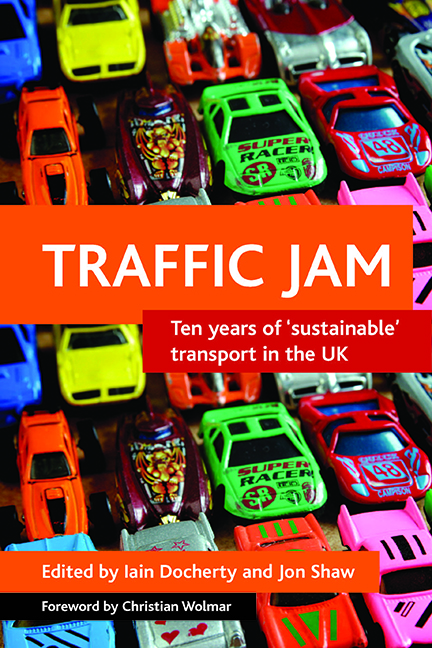Book contents
- Frontmatter
- Dedication
- Contents
- List of tables, figures and boxes
- Foreword
- Preface and acknowledgements
- List of acronyms
- Notes on contributors
- Part One Policy and politics
- Part Two Progress in policy implementation
- Part Three Ten years since A new deal for transport – signposts to the UK’s transport future?
- Index
Foreword
Published online by Cambridge University Press: 21 January 2022
- Frontmatter
- Dedication
- Contents
- List of tables, figures and boxes
- Foreword
- Preface and acknowledgements
- List of acronyms
- Notes on contributors
- Part One Policy and politics
- Part Two Progress in policy implementation
- Part Three Ten years since A new deal for transport – signposts to the UK’s transport future?
- Index
Summary
Trying to find evidence of a coherent transport policy when examining the record of the first decade of the Labour government is rather like attempting to ring up a person whose obituary you have just read in a newspaper. There may have been something approaching a policy once, but there is precious little trace of it now.
Transport was the area in which the Blair governments least exerted themselves and there is little evidence that this is changing under Gordon Brown. There are good short-term political reasons for this. Transport is a long-term issue that delivers little in the lifetime of a politician. Order a shiny new underground line today, and some other bugger, possibly of a rival party, will open it. That, however, is an excuse, not a justification for a quite overwhelming failure. It is hard to point to any transport policy initiatives under Labour that have borne fruit. Most of the positive achievements have occurred in response to an emergency such as the replacement of Railtrack with Network Rail, or were the continuation of Conservative policies like the construction of High Speed 1 or were largely the work of devolved bodies, notably plans for Scottish rail expansion and the introduction of the congestion charge in London (although these were made possible as a result of different legislation introduced by the Labour government).
On the other hand, while the list of achievements can be counted on one hand, the number of missed opportunities resulting from timid policy making requires all digits and more. Of course transport is a difficult issue and there are strong lobbies in favour of the most environmentally damaging modes – car use and aviation. Nevertheless, Labour politicians have shown a quite extraordinary pusillanimity in addressing the most obvious failings of the market to deliver a sustainable transport policy. Where a bit of backbone was required in addressing the fundamental issues, there has been a total lack of vertebrae. Even where progressive policies have been considered or adopted, they have been abandoned in the face of the first hint of serious opposition.
Take, first, roads and driving. The Conservatives’ annual 5% above inflation rise on fuel tax duty was briefly continued and, indeed, increased to 6%. Then, just as it was beginning to bear fruit in terms of reduced traffic growth, the policy was ditched.
- Type
- Chapter
- Information
- Traffic JamTen Years of 'Sustainable' Transport in the UK, pp. viii - xPublisher: Bristol University PressPrint publication year: 2008



